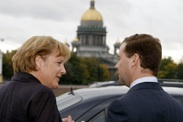
DON'T TALK ABOUT IT
Some older Russian gays criticised the festival organisers, claiming that festival organisers were only interested in provoking a scandal and that they weren‘t interested in the films themselves. "It‘s not the Russian mentality,“ I was told. "You can do it but you must not talk about it.“
But younger Russians, gay and straight, are sick of their society‘s intolerance and hypocrisy. Many of them see no future in their homeland if they or their friends must continue to hide their sexuality. They welcomed the planned festival.
Support also came from outside Russia, with the Berlin International Film Festival offering its catalogue of short films and US, German, Kazakh, Israeli and Australian filmmakers scheduled to visit. In St Petersburg organisers contracted to hold the festival in the Pik Kinocenter, a modern and spacious multiplex in the centre of town. Tickets went on sale early September for the sixteen international features and documentaries and five short film programmes planned for the four day festival starting October 2nd.
CITY PRESSURE
But on September 15th the Moscow-based owners of Pik Kinocenter cancelled their involvement, citing pressure from city and district administrations. Side by Side organisers were without a cinema. With less than three weeks to go and with little backing from the St Petersburg film scene, their search became desperate.
A week before opening night, festival organisers secured two well-established nightclubs, "Sochi“ and "Cafe Place“ as venues. Primarily music and performance spaces, both clubs received surprise visits from the fire inspectorate and police on October 1st. Due to "safety issues“, the clubs would have to close immediately.
Several truckloads of riot police arrived at the venues to back up the fire inspectorate's decision. While the city administration had made little comment on the planned festival, their actions convinced observers that they are its adamant opponents.
HELD IN SECRET
Certain that any public festival at another location would lead to police raids, the festival took place as a private function, held in a hastily converted, cramped and muggy dance studio off Nevsky Prospect. The potential audience was informed via SMS and around 100 people came.
Three documentaries and three feature films were shown on Saturday and Sunday to an enthusiastic crowd of mostly under 30s lesbians and gays. New York film director John Cameron Mitchell presented "Hedwig and the Angry inch" and in his speech encouraged the locals, saying that "love will always win." Time and technical limitations stopped any films without Russian subtitles from being shown. "41 Seconds" was thus, indirectly, banned in Russia.
"Sochi“ was allowed to continue to function as a bar over the weekend, in spite of the claimed "safety issues", "Cafe Place“ was able to reopen on the Monday, after the festival, once the evil, godless, sodomite hordes threatening innocent St Petersburg culture were beaten back.
THE VOICE OF TRUTH
While the public gay and lesbian film festival was stopped by St Petersburg authorities, German Chancellor Merkel and Russian President Medvedev attended an international conference in St Petersburg. During the conference President Medvedev 'called for more clarity and direct talk between Russia and the West, saying what was needed was “the voice of truth stated loudly.” “We have to accept the mutual dependence of countries and nations in the modern world,” Medvedev said. “This interdependence does not only apply to economies, but the spheres of science, technology, culture, and education.”` (www.neurope.eu)
The organisers intend to restart the debate in 2009 and hold a full-scale St Petersburg gay and lesbian film festival, perhaps one where the voice of truth be stated loudly, perhaps Thomas Jefferson's "all men are created equal..." or perhaps just Article 29 of the Russian Constitution:
1.Everyone shall have the right to freedom of thought and speech.
2.Propaganda or campaigning inciting social, racial, national or religious hatred and strife is impermissible. The propaganda of social, racial, national, religious or language superiority is forbidden.
3.No one may be coerced into expressing one's views and convictions or into renouncing them.
4.Everyone shall have the right to seek, get, transfer, produce and disseminate information by any lawful means. The list of information constituting the state secret shall be established by the federal law.
5.The freedom of the mass media shall be guaranteed. Censorship shall be prohibited.
Rodney Sewell, November 24, 2008
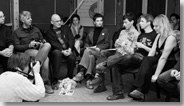
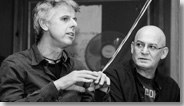

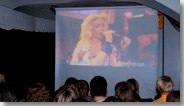

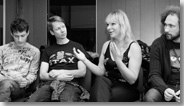
Russian television is wall-to-wall queer, with campy game show hosts, fou-fou fashion designers and outrageous hairdressers more than welcome in prime-time shows. But a recent attempt by lesbian and gay film fans in St Petersburg to stage an LGBT film festival was shot down in flames in a surprisingly well organised effort by city authorities.
While many gay and lesbian films have already been shown at mainstream Russian film festivals and in various art cinemas in Moscow and St Petersburg, the "Side by Side“ organisers were planning Russia‘s very first international LGBT film festival. The group‘s movers and shakers, Irina Sergeeva, Ksenia Zemskaya and Manny de Guerre, Russian emigrées and foreigners now living in St Petersburg, were hoping that it would become a permanent addition to St Petersburg‘s cultural calendar, raising public awareness about LGBT issues and confronting prejudice against sexual minorities. Russian attitudes to gays are overwhelmingly hostile.
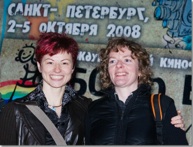
When the festival was announced in late 2007, Irina Sergeeva (left in frame) hoped that "the Side by Side film festival will lead to a fruitful dialogue with the public at large,“ Marketing manager Manny de Guerre (right) added "the success of Side by Side will also serve as a litmus test, showing the extent to which Russia has moved towards a society where individuals are respected and human rights are valued and upheld.“
Eleven months later, it seems clear that Russia has failed that litmus test.
NO POLITICAL SUPPORT
In 1993 the anti-homosexual article 121 introduced to the Soviet criminal code by Stalin was repealed by Boris Yeltsin, under pressure from the Council of Europe but without much enthusiasm from Russia‘s political parties. Since then consenting same-sex relationships have been legal but religious leaders and nationalist, conservative and right-wing politicians rush to condemn any public displays of homosexuality or homosexual culture, Moscow‘s Mayor Lukhov describing a planned gay parade in 2007 as "satanic“.
The announcement in late 2007 of plans to hold the LGBT film festival in St Petersburg caused a storm of controversy. Nikolai Burlyayev, one of Russia‘s foremost actors, called for the festival to be banned, describing homosexuals as perverts and homosexuality as a sin and an illness, while internationally acclaimed film director Alexander Sokurov welcomed the festival, describing the fight against discrimination as "a basic principal of European civilisation“. Homosexuals, he said, "must eventually be accepted.“
photos courtesy bok-o-bok.ru
press conference after the closure
John Cameron Mitchell (centre)
Rodney Sewell (left), Klaus Mabel Ascheneller (Berlin)
Juliette (2nd from right)
Hedwig and the Angry Inch
the packed dance studio
photo courtesy kremlin.ru
Angie and Medvedev in St Petersburg during the festival
